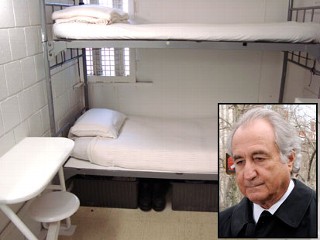Getting the best behind bars: Madoff, other inmates consult pricey prison consultants
Bernie Madoff once had the best that money could buy when it came to his many homes. For his latest accommodations, he sought out a different kind of broker: a type of prison consultant increasingly popular among white-collar wrongdoers.
Madoff, now serving a 150-year sentence at the Butner Federal Correctional Complex near Raleigh, N.C., isn't the only high-profile individual to seek out a specialist to help prepare for life behind bars.
From Martha Stewart to Michael Vick, prison consultants are often hired by celebrities, white-collar miscreants and disgraced politicians to lobby for good prison placement, mitigate sentence length and offer crash courses in prison culture.
Last week's arrests of 44 people in a wide-ranging corruption probe that netted public officials and religious leaders in New York and New Jersey may soon produce a batch of new clients.
The Federal Bureau of Prisons is aware of the work of prison consultants, but the agency treats all requests from prison consultants as it would any request from the general public, said spokeswoman Felicia Ponce. Consultants say that they never promise good placement and that lobbying for it is only one aspect of what they do for their clients.
"It's like going to a foreign country that you've never been to before — different language, people's mannerisms," said Tim Miller of the San Diego-based Dr. Prison consultant service. "When people are entering into the system, we help them look at themselves in ways they may not see themselves."
Miller says his firm first assesses a client's "prison demeanor" and then tailors advice accordingly. Often, former powerbrokers are told they can no longer order others around and shy people are urged to learn to play cards or talk sports so they don't seem anti-social.
Clients are counseled, he said, to always stick with their own race — regardless of how open-minded they might be in the outside world — and are coached to never let anyone cut in front of them in the food line. They're warned that dorm environments are more volatile than single cellblocks and that most altercations take place in the TV room.



Niciun comentariu:
Trimiteți un comentariu